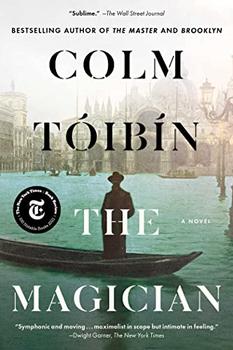Summary | Excerpt | Reading Guide | Reviews | Beyond the Book | Readalikes | Genres & Themes | Author Bio

A Novel
by Colm Toibin
He walked around, touching the newly laundered sheets, but, worried that he might disturb his father, he stepped away.
When his father let out a cry, the sound was so strange that he believed for an instant that someone else was in the room. But then his father began to shout out words and it was a familiar voice that Thomas heard, even though the words made no sense. His father was sitting up in bed, holding his stomach. After some effort, he managed to stand out on the floor only to fall back weakly onto the bed.
Thomas's first response was to move away from him in fright, but as his father lay back moaning with his eyes closed, his hands still holding his stomach, Thomas approached him and asked if he should go and look for his mother.
"Nothing," his father said.
"What? Should I not get my mother?"
"Nothing," his father repeated. He opened his eyes and looked at Thomas, his expression a kind of grimace.
"You know nothing," his father said.
Thomas darted from the room. On the stairs, having found that he had descended one floor too many, he ran up to the lobby and found the concierge, who called the manager. As he was explaining to both what had happened, his mother and Ida appeared.
He followed all of them to the room, only to find that his father was peacefully asleep on the bed.
His mother sighed and quietly apologized for the fuss. Thomas knew that it would be futile to try to explain to her what he had witnessed.
His father continued to weaken when they returned to Lübeck, but he lived until October.
He heard his aunt Elisabeth complain that as the senator lay on his deathbed he interrupted the sacred words of the clergyman with a brisk "Amen."
"He was never good at listening," she said, "but I would have thought that he would listen to the clergyman."
In the last days of their father's life, Heinrich seemed to know how to be with his mother, but Thomas could not think what to say to her. When she hugged him, she pulled him too close; he believed that he offended her by his strenuous efforts to release himself.
When he heard Aunt Elisabeth whispering to a cousin about his father's will, he moved nonchalantly away and then sneaked in close, enough to hear her say that Julia could not be given too much responsibility.
"And the boys!" she said. "Those two boys! The family is over now. I suppose people will laugh at me in the street, the very people who would always bow."
As she continued, the cousin noticed Thomas listening and nudged her.
"Thomas, go and make sure your sisters are properly dressed," Aunt Elisabeth said. "I saw Carla wearing the most unsuitable shoes."
At the funeral, Julia Mann smiled wanly at those who offered her sympathy but did not encourage them to say anything more to her. She retreated into her own world, keeping her daughters close, allowing her sons to represent the family, should that be necessary, by speaking to those who came to console them.
"Can you keep these people away from me?" she asked. "If they ask if there is anything they can do, could you implore them not to look at me in that sorrowful way?"
Thomas had never seen her as so elaborately foreign and mysterious.
A day after the funeral, with her five children in the drawing room, Julia observed that her sister-in-law Elisabeth, with the help of Heinrich, was moving the sofa and one of the armchairs.
"Elisabeth, don't touch the furniture," she said. "Heinrich, put the sofa back where it was."
"Julia, I think the sofa needs to be against the wall. There are too many tables around it where it is. You always have too much furniture. My mother always said—"
"Don't touch the furniture!" Julia interrupted.
Elisabeth moved proudly towards the fireplace and stood there dramatically, like a woman in a play who has been wounded.
Excerpted from The Magician by Colm Toibin. Copyright © 2021 by Colm Toibin. Excerpted by permission of Scribner. All rights reserved. No part of this excerpt may be reproduced or reprinted without permission in writing from the publisher.
Your guide toexceptional books
BookBrowse seeks out and recommends the best in contemporary fiction and nonfiction—books that not only engage and entertain but also deepen our understanding of ourselves and the world around us.